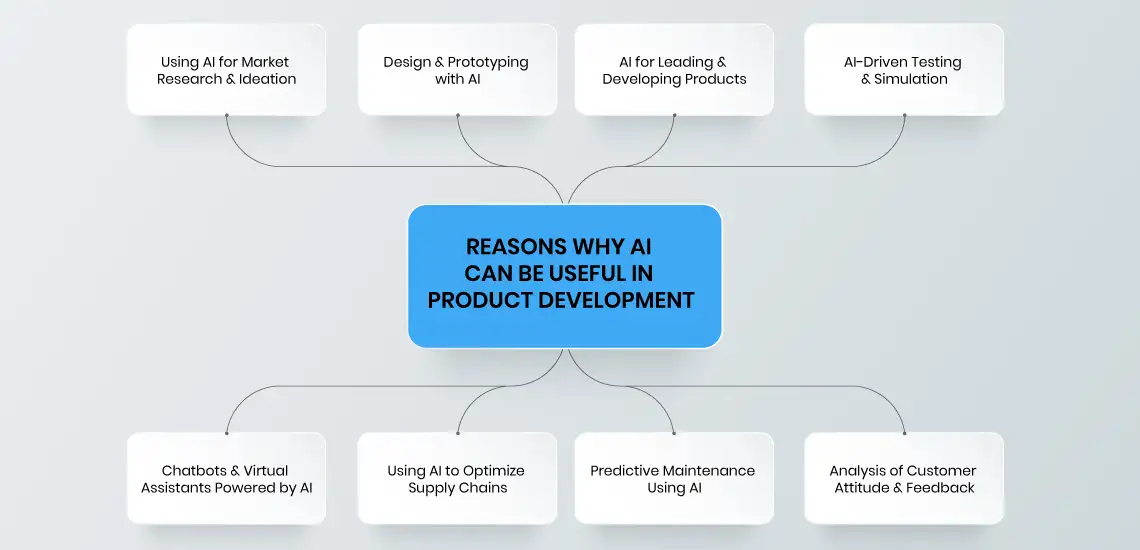USE CASES, EXAMPLES, OBSTACLES, AND SOLUTIONS FOR ARTIFICIAL INTELLIGENCE IN PRODUCT DEVELOPMENT
AI for Product Development The use of AI in product development is changing the game for businesses in terms of product concept, development, and launch. Countless companies are using AI into their product development processes, spanning several industries such as healthcare, education, FinTech, manufacturing, and many more. This blog will take you on a journey through the importance of artificial intelligence (AI) in product development, covering topics such as use cases, real-life examples, pros, cons, and what the future holds.
How about if a robot could assist you in coming up with groundbreaking new products? In this age of total digitization, where artificial intelligence (AI) in product development is causing revolution across all sectors, yes, it is correct. Artificial intelligence (AI) is a game-changer in product development, helping companies succeed at every step of the process from research and design to prototyping and final testing.
The significant role that AI plays in product creation is one reason why the global market for AI is projected to reach $2,688 billion by 2030. Artificial intelligence (AI) aids companies in creating enduring products with fewer mistakes and lower costs through automated operations, efficient decision-making, and predictive analysis. operation: Case Studies, Examples, Obstacles, and Their Resolves.
In this article, we'll look at how artificial intelligence (AI) is changing product creation, why businesses use it, and how it gives them an advantage. This blog also covers the future of AI product development, where to invest, real-life examples of organizations employing AI, implementation issues and solutions, and more.

REAL-WORLD APPLICATIONS OF AI IN NEW PRODUCT DEVELOPMENT
1. AI for Generating Ideas and Conducting Market Research
Insights on trends, customers, competitors, and product ideation can all be aided by AI. It searches social media, market data, and industry reports for new trends. Accurate concept ideation is made possible by natural language processing (NLP), which pulls deeper insights about consumer behavior and preferences from sources including as forums, polls, reviews, and reports. Businesses can strategically compete in the marketplace with the help of AI, which tends to monitor competitors' products, pricing, and market placement. Also, generative AI can generate ideas by analyzing consumer preferences and past market trends to propose new products.
2. AI for the Design and Prototyping Process
By utilizing GANs and deep learning, AI is able to generate numerous design iterations that adhere to the specified limitations. It automates design correction and fastens the development of CAD models. It guarantees quick prototyping by optimizing designs for 3D printing and numerous other manufacturing techniques. In addition, AI is good at suggesting materials, sorting them according to cost, sustainability, and durability, so you can pick the right ones.
3. The Role of AI in Product Management and Development
Artificial intelligence (AI) simplifies PLM by automating mundane processes. By categorizing and ranking client demands according to past data, it guarantees intelligent requirement management. When it comes to optimizing resource planning and allocation, AI has a knack for predicting workflow and material requirements. Improving teamwork and decision-making is a breeze with AI-powered project management software. It finds possible delays in a product launch and offers advice on how to avoid them.
4. Tests and Simulations Driven by AI
By mimicking how a product might behave in different scenarios, AI models allow for virtual testing. It finds possible bottlenecks before physical prototyping, which allows for failure prediction. Artificial intelligence (AI)-driven split testing streamlines digital and physical product multivariate testing. With the use of computer vision, we can verify that our products are safe and up to code.
5. Chatbots and Virtual Assistants Driven by AI
The AI chatbots, made possible by conversational AI and natural language processing, provide instant assistance to both consumers and producers of products. When teams use the virtual assistants, they get help with things like documentation, research, and troubleshooting. By improving voice recognition, AI enables voice-activated interfaces, which in turn increase product control and user experience.
6. Using AI to Optimize the Supply Chain
There is a growing role for artificial intelligence (AI) in supply chain management across a variety of functions, including demand forecasting, logistics and route optimization, supplier management, and risk management. Through the application of ML models, AI is able to optimize inventory levels by predicting patterns of product demand. To assist companies save money, it suggests the most efficient shipping routes. The use of AI allows for the evaluation of supplier performance and the provision of optimal recommendations. Risk management, interruption detection in the supply chain, and the provision of backup plans are all functions that AI-enabled solutions may do.
7. Artificial Intelligence for Predictive Maintenance Applications
Machine health monitoring, failure prediction, and data analysis are all capabilities of AI. In order to prevent malfunctions, it has automatic alerts that warn maintenance teams in advance. In order to reduce costs and downtime, it optimizes maintenance schedules. Integrating IoT devices allows AI to improve predictive analytics using real-time data.
8. Evaluating Customer Attitudes and Comments
Artificial intelligence searches online communities for user opinions on a certain product in order to generate a social media sentiment analysis. Deeper insights can be retrieved from reviews and feedback by using natural language processing. Tools powered by AI often carry out adaptive surveys, giving companies a sense of how satisfied their customers are. Artificial intelligence (AI) plays a crucial role in enhancing product quality by identifying areas that require improvement based on customer feedback.

ARTIFICIAL INTELLIGENCE IN PRODUCT DEVELOPMENT: SMART INVESTMENTS FOR BUSINESSES EAGER FOR THE FUTURE
Several industry-altering trends are on the horizon thanks to the potential of AI to revolutionize product development in the future. The following are examples of some of the most fruitful business verticals in which to invest. Give it a try:
AI-Powered Application Development
A shorter product development lifecycle is achieved through the use of AI in software development. Not only does it improve product quality, but it also speeds up the development process. A more productive and creative product development lifecycle is the result of investing in technologies powered by artificial intelligence that facilitate coding, testing, and deployment. Businesses are utilizing AI-driven automation to streamline software development processes as the role of AI in enterprise expands.
Utilizing AI for Design and Prototyping
Rapid product development through design and prototyping is possible with the help of AI-driven simulations, which also shorten the time it takes to bring a product to market. Because the entire product development and launch process will be sped up, this expedited method guarantees a competitive edge.
AI for Testing and Quality Assurance
By streamlining testing procedures with the help of AI, we may reduce the product's time-to-market without sacrificing quality, functionality, or return on investment (ROI). Customer trust is enhanced by testing tools powered by AI as they improve product quality.
AI for Research in the Market and Predictive Analytics
Organizations may anticipate client demands and industry trends with the help of AI-powered predictive analytics. Aligning product demand and supply is achieved by this proactive strategy, which allows for informed decision-making on product development plans.
Robotics for Production and Streamlining Operations
Artificial intelligence (AI) is effective enough in manufacturing, as it is in many other sectors. The product quality is improved while waste is reduced. As far as AI in manufacturing goes, BMW is where it's at. Using AI, it streamlines car production, which in turn reduces costs, increases precision, and decreases the chance of low-quality products.
AI for Streamlining Inventory and Supply Chain Operations
Artificial intelligence plays a more significant part in SCM. Supply chain operations can be optimized with the use of AI-enabled technologies. These systems can help with demand forecasting, inventory management, automatic replenishment, cost reduction, and product availability.

HOW CAN ORISMEDIA ASSIST YOU IN THE DEVELOPMENT OF AI PRODUCTS?
Although the two letters (AI) may not seem like much on the surface, they actually represent a wealth of opportunities for companies. Businesses may rely on OrisMedia, a top AI development company, for comprehensive AI development services tailored to their specific requirements.
We are a group of carefully selected AI developers who are experts in cutting-edge innovation. We regularly test out new AI PoCs (Proof of Concepts) with the goal of providing state-of-the-art AI development answers with unparalleled ideas. We provide precise robotic process automation (RPA), deep learning solutions, computer vision development, generative AI, and everything else you require.
Would you like some skilled artificial intelligence support with software product development? If so, you have access to a wide variety of high-quality AI development services. Make use of our resources to make your dreams a reality by contacting us today!
Do you have a project in mind? Please describe your project in detail.
